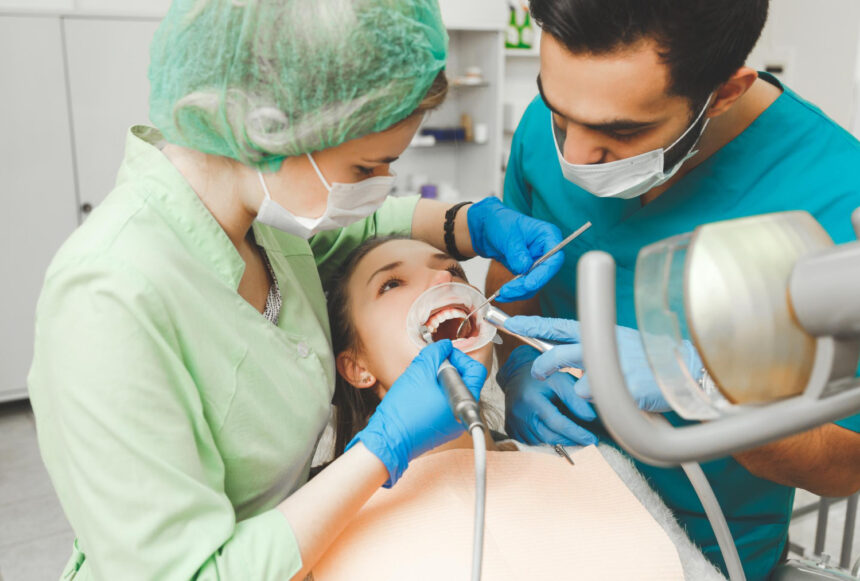Dental emergencies can happen unexpectedly, causing pain and anxiety. Knowing how to find an emergency dentist quickly is crucial to getting the help needed to treat issues like severe toothaches, cracked teeth, or other urgent dental problems. Timely dental care can make a significant difference in outcomes and overall oral health.
Recognizing the signs of a dental emergency is key to taking the right action. Common indicators include intense pain, swelling, and bleeding. Understanding these symptoms and knowing how to respond can help prevent serious complications and reduce the need for more extensive treatment later.
When faced with a dental emergency, having a reliable dentist is important. Many dental practices offer urgent care services, often available on short notice, so patients do not have to suffer. Taking preventive steps through regular dental check-ups can also minimize the likelihood of emergencies in the future, ensuring a healthier smile.
Key Takeaways
- Effective dental care depends on quick access to emergency services.
- Recognizing key symptoms can help in responding promptly.
- Regular check-ups can help prevent future dental emergencies.
Recognizing Dental Emergencies
Dental emergencies can occur unexpectedly and require quick action. Identifying the signs early can prevent further complications and reduce pain. Below are key situations that indicate a need for urgent dental care.
Toothaches and Dental Pain
Severe toothaches may signal an underlying issue, such as tooth decay or an infection. Pain that doesn’t go away with over-the-counter medication should raise concern. Often, a persistent ache can become worse, impacting daily activities and quality of life.
Symptoms may include:
- Throbbing pain in specific areas.
- Sensitivity to hot or cold.
- Pain that worsens when biting or chewing.
If there is swelling or continuous pain, seeking emergency dentist care is essential. Delaying treatment may lead to worse complications, including abscess formation.
Broken or Chipped Teeth
A broken or chipped tooth can happen during accidents, sports, or biting on hard items. Immediate attention may be necessary to save the tooth and avoid infection.
Key actions to take include:
- Gathering any pieces of the tooth if possible.
- Rinsing the mouth gently with warm water to keep the area clean.
- Applying a cold compress to minimize swelling.
Ignoring a broken tooth can lead to further damage or the need for more invasive procedures. Professional care will help restore the tooth’s function and appearance.
Lost Fillings or Crowns
Losing a dental filling or crown can expose sensitive tooth structures. This situation may lead to increased pain or risk of decay. Immediate care is important to prevent further damage.
Suggestions include:
- Avoid eating on the affected side of the mouth.
- Keeping the area clean with gentle brushing.
- Visiting a dentist as soon as possible to discuss options for replacement.
Prompt action helps avoid complications and ensures proper repair is made.
Abscesses and Infections
An abscess in the mouth can present as a swollen area filled with pus. This often indicates a serious infection that needs urgent care. Symptoms may include:
- Severe pain in the affected area.
- Fever and swelling in the face or jaw.
- Unpleasant taste or odor in the mouth.
Treatment may involve antibiotics or drainage of the abscess to relieve pressure. Ignoring this situation can result in the infection spreading, leading to more serious health concerns.
Knocked-Out Teeth
A knocked-out tooth is a critical emergency that demands immediate action. Timely re-implantation increases the chances of saving the tooth.
Steps to take include:
- Holding the tooth by the crown, not the root.
- Rinsing it gently in water if dirty, but not scrubbing.
- Storing it in a glass of milk or saline solution to keep it moist while seeking dental care.
The quicker a dentist can address a knocked-out tooth, the better the outcome. Prompt recognition and action are vital in this situation.
How to Respond to Dental Emergencies
Knowing how to handle dental emergencies can reduce pain and prevent further damage. Quick action is essential in many situations, so being prepared can make a difference. This section outlines first aid measures, pain management techniques, temporary solutions, and when to seek professional help.
First Aid for Dental Injuries
In case of a dental injury, the first step is to remain calm. If a tooth is knocked out, find the tooth and hold it by the crown, not the root. Rinse it gently with water and try to place it back in the socket if possible. If not, keep it in a cup of milk or saline solution to preserve it.
For a cracked or broken tooth, rinse the mouth with warm water to clean the area. Apply a cold compress on the cheek to reduce swelling. If there is bleeding, use a piece of gauze to apply pressure until it stops. These steps can help stabilize the situation until professional care is available.
Managing Pain and Swelling
Pain and swelling often accompany dental emergencies. Over-the-counter pain relievers like ibuprofen or acetaminophen can help manage discomfort. Follow the dosage instructions on the package carefully.
For swelling, apply a cold compress to the affected area for 15-20 minutes at a time. This can help decrease inflammation and alleviate pain. Avoid using heat as it may make the situation worse.
If pain persists despite taking medication, it’s important to seek dental care as it might indicate a more serious issue.
Temporary Solutions at Home
While waiting for professional help, some temporary solutions can ease discomfort. For a lost filling or crown, sugar-free gum can serve as a temporary replacement. Mold it and place it carefully over the tooth.
For a loose or broken wire from braces, use a pencil eraser to push it back into place or cover the sharp end with orthodontic wax. This can prevent cuts or injuries to the inside of the mouth.
These are stopgap measures until a dentist can provide permanent solutions.
When to Seek Immediate Care
Certain situations require immediate professional help. If a tooth is completely knocked out, getting to a dentist within an hour increases the chances of saving it.
Other urgent signs include severe toothaches, noticeable swelling, or fever, which may indicate an infection.
In cases of trauma to the jaw or significant bleeding that doesn’t stop, go to the emergency room. Quick action in these instances can help prevent serious complications.
Choosing an Emergency Dentist
Selecting the right emergency dentist is crucial for receiving prompt and effective care. Key factors to consider include the dentist’s qualifications, availability, and how well they work with your insurance plan.
What to Look for in a Dentist
When searching for an emergency dentist, consider their qualifications and experience. Check if the dentist is licensed and has good reviews from previous patients. A reputable dentist often provides a range of services, including treatments for toothaches, broken teeth, or infections.
It may be helpful to ask about their approach to patient care. A dentist who is calm and comforting can help ease anxiety during emergencies. Furthermore, ensure they are part of professional organizations, which can indicate their commitment to ongoing education and quality care.
Availability and Accessibility
Availability is a key factor in selecting an emergency dentist. An ideal dentist should provide services outside normal working hours. Many dental emergencies happen during nights or weekends, so look for dentists who offer 24/7 services.
Consider how easily you can reach the dental office. Is it nearby? Can you get there quickly in case of an emergency? Accessibility can make a significant difference when time is of the essence. A practice with flexible appointment options can provide more convenience.
Insurance and Payment Options
Understanding insurance and payment options helps avoid surprises later. Verify if the emergency dentist accepts your insurance plan. Some practices may offer a list of accepted plans on their website.
It is also wise to ask about payment plans if you do not have insurance. Some dentists may provide financing options or discounts for emergency visits. Knowing the costs in advance can help provide peace of mind during a stressful situation.
Preventing Dental Emergencies
Taking proactive steps can significantly reduce the risk of dental emergencies. By focusing on dental care routines, protective gear in sports, diet choices, and regular check-ups, individuals can help maintain their dental health and prevent unexpected issues.
Routine Dental Care and Hygiene
Good oral hygiene is essential in preventing dental emergencies. Brushing teeth at least twice a day with fluoride toothpaste helps remove plaque that can lead to decay. Using dental floss daily is also crucial for cleaning between teeth where a toothbrush can’t reach.
A mouthwash that kills bacteria may further reduce the risk of gum disease. It’s important to replace toothbrushes every three to four months, or sooner if the bristles are frayed. People should visit their dentist regularly to identify potential issues early on and receive professional cleanings.
Protective Gear for Sports
Wearing protective gear during sports is vital for avoiding dental injuries. A custom-fitted mouthguard offers effective protection for teeth and jaw during contact activities such as football or basketball. Mouthguards can also prevent concussions by reducing the impact on the jaw.
Players in high-contact sports should always wear this protective gear, even during practices. Additionally, those who grind their teeth at night should consider using a nightguard, which can save their teeth from further damage while sleeping.
Diet and Oral Health
Diet plays a significant role in oral health and can influence the risk of dental emergencies. Consuming excessive sugary foods and drinks increases the chance of cavities, leading to pain and potential emergencies. A balanced diet rich in fruits, vegetables, and whole grains supports healthy teeth.
Calcium and vitamin D are vital for strong teeth and bones, found in dairy products, leafy greens, and fortified foods. Limiting acidic foods and drinks can protect enamel from erosion. Staying hydrated and drinking water helps wash away food particles and bacteria after meals.
Regular Check-Ups and Cleanings
Regular dental check-ups and cleanings are essential for maintaining dental health. Dentists can identify problems before they escalate into emergencies. It’s recommended to schedule visits every six months to monitor oral health and receive professional cleanings.
During the visit, the dentist will check for signs of decay, gum disease, and other issues. Early detection can lead to simple treatments rather than more complicated procedures later. Most importantly, having a consistent dental care routine at home reinforces the benefits of regular visits.






